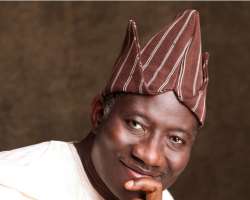President Jonathan's Speech Sets Agenda For Conference—Delegates

Isa Ajiya told the delegates that the beauty of the President's speech would only achieve its purpose if they reason together as Nigerians, not as northerners or southerners, not as Muslims or Christians, adding “at the end, Nigeria will shine again.”
Describing the speech as a summary of impediments that must be cleared for Nigeria to grow and “delivered confidently and convincingly” Olaniwun Ajayi said Nigeria has remained a country blessed with talents but “where the best is yet to happen.”
Nike Akande in her comments said she was more concerned about Nigeria's march towards rapid development; a situation she said would justify Jonathan's expectation in the Conference which she described as a “landmark journey that will make us proud as a nation.”
In the same vein, Chief Femi Akande said with the elegant speech “full of candour” it was possible to see a stronger and more stable Nigeria arising from the Conference if the delegates remain committed and focused.
Olusola Akanmode demanded of the Conference to make suggestions for inclusion in the constitution regarding the need for timeline on deadlines for submission of budgets by the executive and passage by the lawmakers at all levels of governance.
Based on the President's speech, retired Justice Peter Akere said delegates must thoroughly examine why institutions worked effectively in the past, even under colonial administration, particularly in the areas of anti-corruption, revenue and infrastructural development but collapsed thereafter.
Felix Akhabue was of the opinion that the outcome of the Conference must clear the polity of mindsets of the past so that the country can move forward; adding that a deliberate decision by Nigerians to accommodate each other beyond ethnic lines would serve as the starting point to the greatness of Nigeria.
Former Police Chief, Bashiru Albasu, lamented the poor security situation in Nigeria from the far north to the deep south and urged delegates to view it as a matter of urgent national importance.
Former Chairman of the Peoples Democratic Party, Dr. Ahmadu Ali, said the speech delivered by the President should serve as a guiding principle to the Conference; he described it as a speech from the heart of someone who loves Nigeria.
Ambassador Adamu Aliyu told the delegates that Jonathan's speech was monumental and indicated no hidden agenda.
Esther Andrew, a delegate living with disability, pulled the crowd to applause when she called for special attention to the plight of the disabled in the country and thanked the President for making them a part of the Conference.
She said the negative attitude of the society towards the disabled was not in the nation's interest, adding: “we don't need sympathy, we need empathy, we need support, we want to go to school,” although she said most of the educational institutions in Nigeria are not disabled-friendly.
When the Conference resumed in the afternoon, the issue of religion surfaced as two Christian leaders, Bishop Joseph Bagobiri and Pastor Emmanuel Bosun painted pictures of constitutional issues that have created the impression that Nigeria has a state religion.
In conclusion, Bagobiri said the conference must right what is wrong about the 1999 Constitution and that except the inconsistencies smuggled into the constitution were addressed, “then what we are doing here will not bring equity to all Nigerians. We should respect the sanctity of the secularity of the country.”
Bosun, whose contribution attracted a Point of Order which was over-ruled, said Nigeria was daily producing widows and orphans in their thousands because religion has become a manipulative tool used to cause destruction and that there was need for the Conference to take a critical look at the 1999 Constitution.
An environmental activist, Nnimmo Bassey, said Jonathan's speech was a call for the delegates to remember they are in a conference to reconstruct Nigeria and that delegates need to bury their pettiness and look at issues that would make life better for the citizens.
Tunde Bakare said, “The President has made plain his expected outcome of this Conference. If our expectations are different from his, then we are in a jamboree. It appears Mr. President knew his onions and laid them bare that the greatest problem facing Nigeria today is the issue of governance.”
Former Governor of Bayelsa State, DSP Alamiyeseigha, described the President's speech as revolutionary and statesmanlike because it captured issues that have bedeviled the country since its amalgamation in 1914.
For Mariam Jummai Bello, the problem of Nigeria lies with the women who have refused to bring up their children in a manner that would ensure respect for the law and focus on character development.
Although Conference Chairman and former Chief Justice of Nigeria, Justice Idris Legbo Kutigi had placed embargo on clapping, Bello's contribution was heavily applauded when she accused women of pushing their husbands to engage in corrupt act as a short cut to luxurious living.
Signed
AKPANDEM JAMES
Assistant Secretary, Media and Communications
